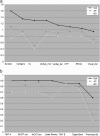Cognitive impairment in schizophrenia and affective psychoses: implications for DSM-V criteria and beyond
- PMID: 19776206
- PMCID: PMC2800141
- DOI: 10.1093/schbul/sbp094
Cognitive impairment in schizophrenia and affective psychoses: implications for DSM-V criteria and beyond
Abstract
It has recently been suggested that the diagnostic criteria of schizophrenia should include specific reference to cognitive impairments characterizing the disorder. Arguments in support of this assertion contend that such inclusion would not only serve to increase the awareness of cognitive deficits in affected patients, among both clinicians and researchers alike, but also increase the "point of rarity" between schizophrenia and mood disorders. The aim of the current article is to examine this latter assertion in light of the recent opinion piece provided by Keefe and Fenton (Keefe RSE, Fenton WS. How should DSM-V criteria for schizophrenia include cognitive impairment? Schizophr Bull. 2007;33:912-920). Through literature review, we explore the issue of whether cognitive deficits do in fact differentiate the major psychoses. The overall results of this inquiry suggest that inclusion of cognitive impairment criteria in Diagnostic and Statistical Manual of Mental Disorders (Fifth Edition) (DSM-V) would not provide a major advancement in discriminating schizophrenia from bipolar disorder and affective psychoses. Therefore, while cognitive impairment should be included in DSM-V, it should not dictate diagnostic specificity--at least not until more comprehensive evidence-based reviews of the current diagnostic system have been undertaken. Based on this evidence, we consider several alternatives for the DSM-V definition of cognitive impairment in schizophrenia, including (1) the inclusion of cognitive impairment as a specifier and (2) the definition of cognitive impairment as a dimension within a hybrid categorical-dimensional system. Given the state of current evidence, these possibilities appear to represent the most parsimonious approaches to the inclusion of cognitive deficits in the diagnostic criteria of schizophrenia and, potentially, of mood disorders.
Figures
Comment in
-
Anticipating DSM-V: opportunities and challenges for cognition and psychosis.Schizophr Bull. 2010 Jan;36(1):43-7. doi: 10.1093/schbul/sbp139. Epub 2009 Nov 18. Schizophr Bull. 2010. PMID: 19923191 Free PMC article. No abstract available.
References
-
- Heinrichs RW, Zakzanis KK. Neurocognitive deficits in schizophrenia: a quantitative review of the evidence. Neuropsychology. 1998;12:426–445. - PubMed
-
- Aleman A, Hijman R, De Haan EHF, Kahn RS. Memory impairment in schizophrenia: a meta-analysis. Am J Psychiatry. 1999;156:1358–1366. - PubMed
-
- Dickinson D, Ramsey ME, Gold JM. Overlooking the obvious: a meta-analytical comparison of digit symbol coding tasks and other cognitive measures in schizophrenia. Arch Gen Psychiatry. 2007;64:532–542. - PubMed
-
- Bokat CE, Goldberg TE. Letter and category fluency in schizophrenic patients: a meta-analysis. Schizophr Res. 2003;64:73–78. - PubMed
Publication types
MeSH terms
LinkOut - more resources
Full Text Sources
Medical



